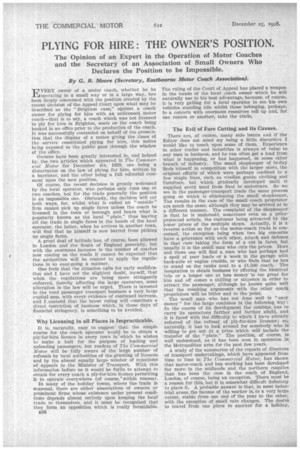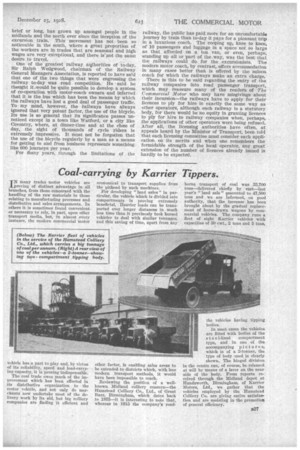• PLYING FOR HIRE: THE OWNER'S POSITION.
Page 14

Page 15

If you've noticed an error in this article please click here to report it so we can fix it.
The Opinion of an Expert in the Operation of Motor Coaches and the Secretary of an Association of Small Owners Who Declares the Position to be Impossible.
By G. R. Moore (Secretary, Eastbourne Motor Coach Association).
'LIVERY owner of a motor coach, whether he be operating in a small way or in a large way, has been deeply concerned with the position created by the recent decision of the Appeal Court upon what may be described as the "-Brighton case," against a coach
owner for plying for hire with an unlicensed motor coach—that is to say, a coach which was not licensed to ply for hire in Brighton, seats on the coach being booked in an office prior to the production of the coach. It was successfully contended on behalf of the prosecution that the display of a notice giving the times of the service constituted plying for hire, this notice bcing exposed to the public gaze through the window of the office.
Owners have been greatly interested in, and helped by. the two articles which appeared in The Commercial Motor for December 4th, 1928, one being a dissertation on the law of plying for hire, written by a barrister, and the other being a full editorial comment upon the new position.
Of course, the recent decision is greatly welcomed by the local operator, who perhaps only runs one or two coaches, but for the trade generally the position is an impossible one. Obviously, the decision will cut both ways, for, whilst what is called an "outside" firm cannot -pick up single fares unless the coach be licensed in the town or borough and bears what is popularly known as the local "plate," thus leaving all the trade in single fares in the hands of the local operator, the latter, when he arrives in another town, will find that he himself is now barred from picking up single fares.
A great deal of latitude has, of course, been allowed in London and the South of England generally, but with the enormous increase in the number of coaches now coming on the roads it cannot be expected that the authorities will be content to apply the regulations in so easy-going a manner.
One feels that the situation calls for early modification and I have not the slightest doubt, myself, that when the regulations are being more stringently enforced, thereby affecting the large operators, some alteration in the law will be urged. There is invested in the road passenger transport business a very large capital sum, with every evidence of continued increase, and I contend that the latest ruling will constitute a direct restriction of business which, in these days -of financial stringency, is something to be avoided.
Why Licensing in all Places is Impracticable.
It is, naturally, easy to suggest that !he simple course for the coach operator would be to obtain a ply-for-hire licence in every town in'which he wishes to make a halt for the purpose of loading and unloading passengers, but readers of The Commercial Motor will be fully aware of the large number of refusals by local authorities of the granting of licences. and by the almost equally large number of rejections of appeals to the Minister of Transport. With this information before us it would be futile to attempt to obtain for every coach a ply-for-hire licence permitting it to operate everywhere (of course,`within reason).
In many of the holiday towns, where the trade is seasonal, there are either associations of owners or prominent firms whose existence under present conditions depends almost entirely upon keeping the local trade to themselves, and it must be recognized that they form an opposition which is really formidable.
B26
The ruling of the Court of Appeal has placed a weapon in the hands of the local coach owner which he will naturally use to his best advantage, because, of course, it is very galling for a local operator to see his own vehicles standing idle whilst those belonging, perhaps, to a concern with enormous resources roll up and, for one reason or another, take the trade.
The Evil of Fare Cutting and its Causes.
There are, of course, many side issues and if the Editor does not mind my being a little discursive I would like to touch upon some of them. Experience in other trades and industries is always of value to any man in business, and he can often get a lead from what is happening, or has happened, in some other branch of industry. The small shopkeeper of to-day finds himself in competition with the larger store, the original efforts of which were perhaps confined to a few staple lines, such as woollen goods, clothing and furniture, but which gradually developed until it supplied every need from food to motorcars. So we see in the passenger-transport trade the same process going on which is eliminating the small shopkeeper. The results in the case of the small coach proprietor are much the same, although they may be arrived at in a different manner. The complaint of the shopkeeper is that he is undersold, sometimes even on a priceprotected article, the customer being attracted by the lower prices of the multiple shops. Actually, it is a reverse action so far as the motor-coach trade is concerned, the exception being when two big concerns have a grievance with each other, attack and defence In that case taking the form of a cut in fares, but usually it Is the small man who cuts the prices. Here, and there one will find a man who has perhaps had a spell of poor loads or a week in the garage with back-axle or engine trouble, or who finds that he has to stand on the ranks next to a £1,500 coach. The temptation to obtain business by offering the identical trip or a longer one at less money" is too great for him and off comes a shilling or sixpence in order to attract the passenger, although he knows quite well that the resulting arguments with the other coach proprietors will be bitter andto the point.
The small man who has not done well is "easy money" for the large combines in the following way: In the course of its development the combine has to carry its operations farther and farther afield, and it is faced with the difficulty to which I have already referred of the refusal of ply-for-hirelicences; so, naturally, it has to look around for somebody who is willing to get out at a price which will include the transfer of the "plate," The position, of course, is well understood, as it has been seen in operation in the Metropolitan area for the past few years.
A study of the summaries of the reports of directors of transport undertakings, which have appeared from time to time in The Commercial Motor, has shown that motor-coach and bus working has been developed far more in the midlands and the northern counties than has been the case in the south of England, London, of course, being an exception. There must be a reason for this, but it is somewhat difficult definitely to place it. A probable answer is that, in most industrial areas, the income of the worker is, to a very large extent, stable from one end of the year to the other, with the exception of small rate changes. The desire to travel from one place to another for a holiday,
brief or long, has grown up amongst people in the midlands and the north ever since the inception of the excursion train. This movement has not been so noticeable in the south, where a great proportion of the workers are in trades that are seasonal and high wages are very exceptional, and there is'not the same desire to trav,e1.
One of the greatest railway aqthorities of to-day, Sir Ralph Wedgwood, chairman of the Railway General Managers Association, is reported to have said that one of the two things that were engrossing the railway, to-day was road competition. He said he thought it .would be quite possible to develop a system of co-operation with motor-coach owners and inferred that it is the bus which has been the means by which the railways have lost a good deal of passenger traffic. To my mind, however, the railways have always ignored that very potent factor, the use of the bicycle. Its use is so general that its significance passes unnoticed except in a town like Watford, or a city like Coventry, where, at dinner-time and at the close of day, the sight of thousands of cycle riders is extremely impressive. It must not be forgotten that the use of the bicycle regularly by a man as a means for getting to and from business represents something like 600 journeys per year.
For ffiany years, through the limitations of the
railway, the public has paid more for an uncomfortable journey by train than to-day it pays for a pleasant trip in a luxurious coach. The cooping up, knee to knee, of 10 passengers and luggage in a-space not so large as that afforded on a ton van, or even, perhaps, standing up all or part of the way, was the best that the railways could do for the excursionists. The modern motor coach, by contrast, offers accommodation in many cases better than is offered by the saloon coach for which the railways make an extra charge.
There is this to be said regarding the entry of the railway companies into road passenger transport, which may reassure many of the readers of The Commercial Motor who may have misgivings about their incursion—the railways have to apply for their licences to ply for hire in exactly the same way as other operators, although each railway is a statutory body, for there would be no equity in granting licences to ply for hire to railway companies when, perhaps, the applications of other operators were being refused. After all, the licensing authorities have often, at appeals heard by the Minister of Transport, been told that each licensing committee must consider each application on its merits and when one remembers the formidable strength of the local operator, any great extension of the number of licences already issued is hardly to be expected.






























